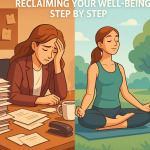This article is for informational purposes only and is not a substitute for professional medical advice. Always consult a healthcare provider for concerns regarding sleep and mental health.
The Crucial Link Between Sleep and Mental Health
Have you ever noticed how a poor night’s sleep can leave you feeling irritable or anxious the next day? The connection between sleep and mental health is profound and multifaceted. Understanding this relationship can empower you to improve both your sleep quality and your overall mental well-being.
Understanding Sleep and Its Stages
Sleep is not merely a state of rest; it is a complex biological process essential for physical and mental health. During sleep, our bodies undergo various stages, including REM (Rapid Eye Movement) and non-REM sleep. Each stage plays a unique role in restoring our bodies and minds.
The Stages of Sleep
- Stage 1: Light sleep, where you drift in and out of sleep.
- Stage 2: The onset of true sleep, characterized by a decrease in body temperature and heart rate.
- Stage 3: Deep sleep, crucial for physical recovery and growth.
- REM Sleep: Associated with dreaming, this stage is vital for emotional regulation and memory consolidation.
How Sleep Affects Mental Health
Research indicates that sleep disturbances can lead to a range of mental health issues, including anxiety and depression. According to the National Institutes of Health, individuals with insomnia are ten times more likely to develop depression than those who sleep well.
The Bidirectional Relationship
It’s essential to recognize that the relationship between sleep and mental health is bidirectional. Poor sleep can exacerbate mental health issues, while conditions like anxiety and depression can lead to sleep disturbances. This cycle can create a challenging environment for recovery. For instance, a person suffering from anxiety may find it difficult to relax enough to fall asleep, which in turn can increase their anxiety levels.
The Science Behind Sleep Disorders
Sleep disorders, such as insomnia and sleep apnea, can significantly impact mental health. Insomnia, characterized by difficulty falling or staying asleep, can lead to cognitive impairments and emotional dysregulation. On the other hand, sleep apnea, which involves interrupted breathing during sleep, has been linked to increased risks of depression and anxiety.
Insomnia and Anxiety
Studies show that insomnia can increase anxiety levels, creating a vicious cycle. A lack of sleep can heighten feelings of worry and fear, making it even more challenging to achieve restful sleep. The CDC reports that about 30% of adults experience insomnia at some point in their lives.
Sleep Apnea and Depression
Sleep apnea can lead to fragmented sleep, which may contribute to depressive symptoms. A study published in the Journal of Clinical Psychiatry found that individuals with untreated sleep apnea had higher rates of depression compared to those who received treatment. This highlights the importance of addressing sleep disorders not only for physical health but also for mental well-being.
Pathophysiology of Sleep and Mental Health
The mechanisms linking sleep and mental health are complex and involve various biological systems. Sleep deprivation can lead to dysregulation of neurotransmitters such as serotonin and dopamine, which play critical roles in mood regulation. Additionally, chronic sleep issues can increase levels of stress hormones like cortisol, contributing to anxiety and depressive symptoms.
Neuroinflammation and Sleep
Recent studies suggest that sleep disturbances may promote neuroinflammation, further exacerbating mental health conditions. For instance, elevated levels of inflammatory markers have been found in individuals with insomnia and depression, indicating a potential pathway through which poor sleep can affect mental health (source: Nature Reviews Neuroscience). This neuroinflammatory response might disrupt neural circuits involved in mood regulation, leading to a heightened risk of mood disorders.
Sleep Hygiene: Tips for Better Sleep
Improving sleep hygiene can have a significant impact on your mental health. Here are some practical tips:
- Establish a Routine: Go to bed and wake up at the same time every day, even on weekends. This consistency helps regulate your body’s internal clock.
- Create a Restful Environment: Keep your bedroom dark, quiet, and cool. Consider using earplugs or a sleep mask if necessary. A comfortable mattress and pillow can also enhance sleep quality.
- Limit Screen Time: Reduce exposure to screens at least an hour before bedtime, as blue light can interfere with melatonin production. Instead, opt for reading a book or listening to soothing music.
- Watch Your Diet: Avoid heavy meals, caffeine, and alcohol close to bedtime. These substances can disrupt your sleep cycle and lead to restless nights.
- Engage in Relaxation Techniques: Practices such as meditation, deep breathing, or gentle yoga can help calm your mind and prepare your body for sleep.
Case Vignette: A Journey to Better Sleep
Consider Sarah, a 32-year-old marketing professional who struggled with insomnia for several years. Her sleep issues began after a stressful project at work, leading to increased anxiety and feelings of depression. After recognizing the impact of her poor sleep on her mental health, Sarah sought help. She started practicing sleep hygiene, establishing a consistent bedtime routine, and incorporating mindfulness meditation into her evenings. Within weeks, Sarah noticed significant improvements in her sleep quality and a reduction in her anxiety levels. Her story illustrates how prioritizing sleep can lead to better mental health outcomes.
The Role of Circadian Rhythms
Circadian rhythms, the natural processes that regulate the sleep-wake cycle, play a crucial role in mental health. Disruptions to these rhythms, such as shift work or irregular sleep patterns, can lead to mood disorders and cognitive decline. Maintaining regular sleep-wake cycles can help stabilize mood and improve overall mental health.
Light Exposure and Mental Health
Natural light exposure during the day helps regulate circadian rhythms. A study published in the Journal of Affective Disorders found that individuals who spent more time outdoors reported better mood and less anxiety. Aim for at least 30 minutes of natural light exposure daily to support your mental health. This simple practice can enhance your mood and energy levels, making it easier to engage in daily activities.
Seeking Help for Sleep Issues
If you’re struggling with sleep, it’s essential to seek help. Mental health professionals can provide guidance and strategies tailored to your needs. Cognitive Behavioral Therapy for Insomnia (CBT-I) is an effective treatment that addresses the thoughts and behaviors contributing to sleep problems. This therapeutic approach has been shown to improve sleep quality and reduce insomnia symptoms.
When to Consult a Doctor
Consult a healthcare provider if you experience persistent sleep disturbances or if your sleep issues significantly impact your daily life. They can help identify underlying conditions and recommend appropriate treatments. Don’t hesitate to reach out for help; addressing sleep issues early can prevent the development of more serious mental health concerns.
Myth-Busters: Common Misconceptions About Sleep
- Myth 1: You can catch up on sleep during the weekends.
Reality: While sleeping in may help, it doesn’t fully compensate for the negative effects of chronic sleep deprivation. This can lead to a phenomenon known as “social jetlag,” where your body struggles to adjust back to a regular schedule. - Myth 2: Alcohol helps you sleep better.
Reality: Alcohol may help you fall asleep faster, but it disrupts sleep cycles and reduces sleep quality. It can also lead to increased awakenings during the night. - Myth 3: Older adults need less sleep.
Reality: Sleep needs vary by individual, but many older adults still require 7-8 hours of sleep for optimal health. Age-related changes in sleep patterns can affect sleep quality, but not necessarily the amount needed.
The Importance of Self-Care
Incorporating self-care practices into your daily routine can enhance both sleep quality and mental health. Activities such as journaling, spending time in nature, and engaging in hobbies can help reduce stress and promote relaxation. Self-care is not just a luxury; it is a necessity for maintaining mental health.
Mindfulness and Sleep
Mindfulness practices, including meditation and breathing exercises, have been shown to improve sleep quality. A study in the Journal of Clinical Psychology found that mindfulness meditation can significantly reduce insomnia symptoms. Consider integrating mindfulness into your bedtime routine to enhance relaxation. Even a few minutes of focused breathing can help transition your mind into a more restful state.
Conclusion: Prioritizing Sleep for Mental Well-Being
Understanding the impact of sleep on mental health is crucial for overall well-being. By prioritizing sleep hygiene, recognizing the signs of sleep disorders, and seeking help when needed, you can break the cycle of poor sleep and mental health issues. Remember, quality sleep is not just a luxury; it is a fundamental pillar of good mental health. Make sleep a priority in your life, and you may find improvements in your mood, cognitive function, and overall quality of life.
Key Takeaways
- Sleep is essential for mental health, affecting mood, anxiety, and cognitive function.
- Poor sleep can exacerbate mental health issues like depression and anxiety.
- Establishing a consistent sleep routine can improve sleep quality and overall well-being.
- Circadian rhythms play a critical role in regulating sleep and mental health.
- Seeking professional help for sleep issues can lead to effective treatment and recovery.
References
- National Institutes of Health. (2008). Insomnia and Depression.
- Centers for Disease Control and Prevention. (2021). Insomnia.
- Journal of Clinical Psychiatry. (2019). The relationship between sleep apnea and depression.
- Journal of Affective Disorders. (2018). Light exposure and mood.
- Journal of Clinical Psychology. (2017). Mindfulness meditation and insomnia.
- Nature Reviews Neuroscience. (2018). Neuroinflammation and sleep disturbances.








Post a comment